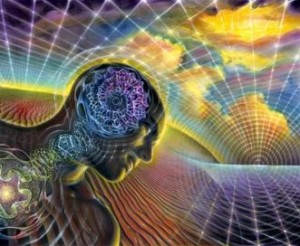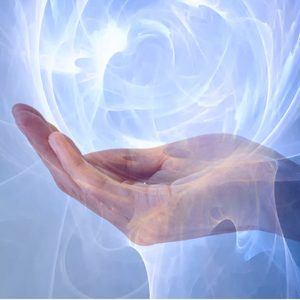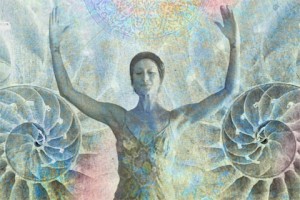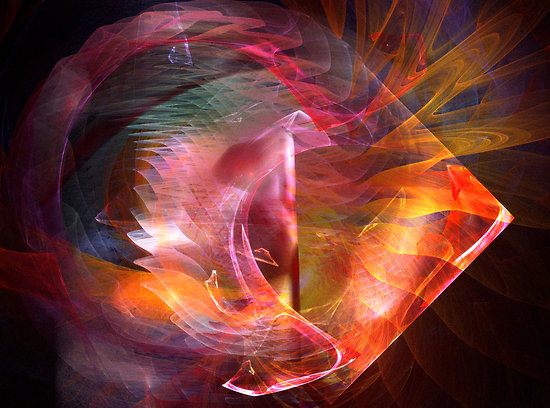Sitting on the patio during a drizzle, the wind suddenly picks up, the rain falls harder, and there’s a feeling almost of fury about the earth.
 Though gusts were spraying me occasionally, it wasn’t cold, and after half an hour I didn’t want to come in. There hadn’t been a trace of blue, or even any contrast in the solid wall of grayness, but suddenly the skies brightened with an otherworldly whitish hue. It was sunset.
Though gusts were spraying me occasionally, it wasn’t cold, and after half an hour I didn’t want to come in. There hadn’t been a trace of blue, or even any contrast in the solid wall of grayness, but suddenly the skies brightened with an otherworldly whitish hue. It was sunset.
The land, wind-whipped trees and featureless sky felt sacramental, and for a few minutes the earth held the infinite mystery of the universe itself.
Thought had grown still in undivided observation and undirected attention. Watching the movement of the mind and emotions without interference but with an intensity aligned in some small measure with the storm, the habitual and noisy operations the brain essentially ceased. It always as a surprise when the movement of negation ignites a meditative state.
Without making a duality, much less a triality, there are three inseparable movements—the movement of thought/emotion; the movement of negation; and the movement of sacredness. The paradox is that the movement of thought is the movement of separation, but one that can and must be observed without division.
Attention to thought/emotion initiates the movement of negation, ending the separative movement of thought; and the movement of negation ignites a meditative state in which there is communion with something beyond thought and material existence.
Of course the existence of the sacred can never be proven, but only a dogmatically empirical and materialistic mind insists on proof of spiritual realities before even allowing the possibility of their existence. Such a mind is no different than the believer’s mind, which is equally blocked from receiving benediction by the impacted material of its beliefs, traditions, and theologies.
insists on proof of spiritual realities before even allowing the possibility of their existence. Such a mind is no different than the believer’s mind, which is equally blocked from receiving benediction by the impacted material of its beliefs, traditions, and theologies.
Most ‘educated’ people now believe there is nothing but the meanings we create, nothing beyond the human mind, chance, and purposeless evolution. Sadly, that is their ignorance. For when thought is deeply quiet, the same feeling is awakened in one’s backyard patio, or sitting in a room at dusk dying to the light of day, as when you first see the Grand Canyon or Yosemite Valley.
Meditation is not just about stress reduction; it’s about having a truly religious life, which has nothing to do with churches! In short, and to put in in Christian terms, meditation helps one to grow in the grace of God.
However, one has to sustain a certain unforced diligence. In practical terms, that means devoting a half hour each day to passive observation, and setting everything else aside. One has to take the space and make the space for meditation to occur.
Meditation really simply means knowing how to observe one’s own mind and heart. Normally we choose what to think about, and think we are free in the ability to choose. But who or what chooses? It’s still conditioning and thought, as the ‘me’ or ‘I’ that chooses.
Taking a half hour, go into a room at dusk, or sit outside if you have a place and the weather permits, and let the senses come to what’s actually occurring in the present. Especially, listen to the sounds. Sound is the best teacher.
 When your senses have come into the present, and you’re just listening to the sounds as they reach your ears, without even naming them, let attention come to the movement of your thoughts and emotions in the same way. It’s like watching a raging creek going by with leaves and logs in it; you don’t jump in and try to do something about the leaves and logs, you just let them flow by. This is how to observe, and initiate the movement of attention and negation in meditation, which calms the mind and cleanses the heart.
When your senses have come into the present, and you’re just listening to the sounds as they reach your ears, without even naming them, let attention come to the movement of your thoughts and emotions in the same way. It’s like watching a raging creek going by with leaves and logs in it; you don’t jump in and try to do something about the leaves and logs, you just let them flow by. This is how to observe, and initiate the movement of attention and negation in meditation, which calms the mind and cleanses the heart.
I find it helps to have a pad and jot things down to clear away details and unimportant things; that allows space and naturally orders in the mind. Things will come to mind when you sit down, things like details about work, problems, things you have to do later, etc. If you jot them down and say, ‘I’ll deal with that later, when the time is right,’ then space opens up in the mind and heart. At minimum, one is less burdened, and the mind is a little less noisy.
The essential thing is not to direct your observation or choose the things you think about. Let it all flow by, and let it all go by. Just listen and watch, outwardly and inwardly, without division (as ‘me’ watching) or choice.
With persistence but without goal or idea, something tremendous happens–a true shift in consciousness. That benefits not only the brain and body of the individual, but to some small degree (since our consciousness is not separate from collective consciousness) the whole of humanity as well.
Martin LeFevre

